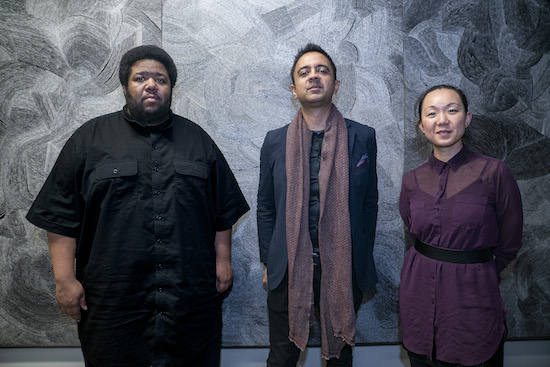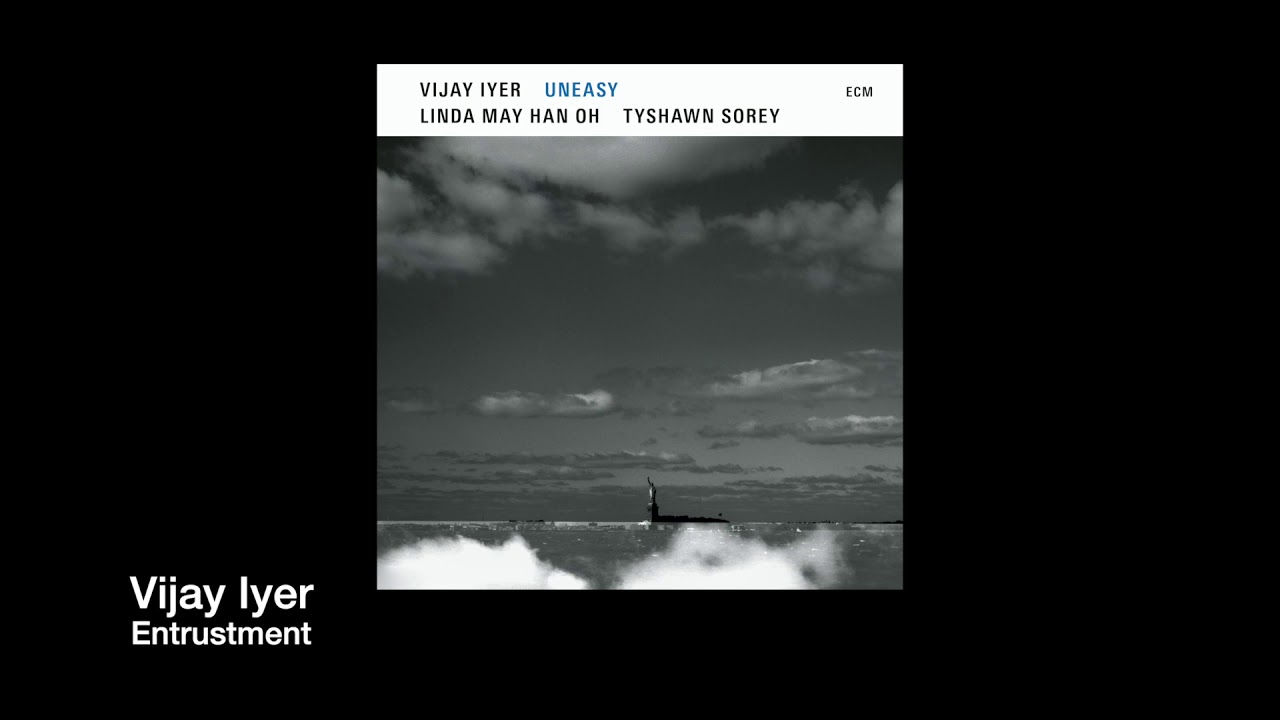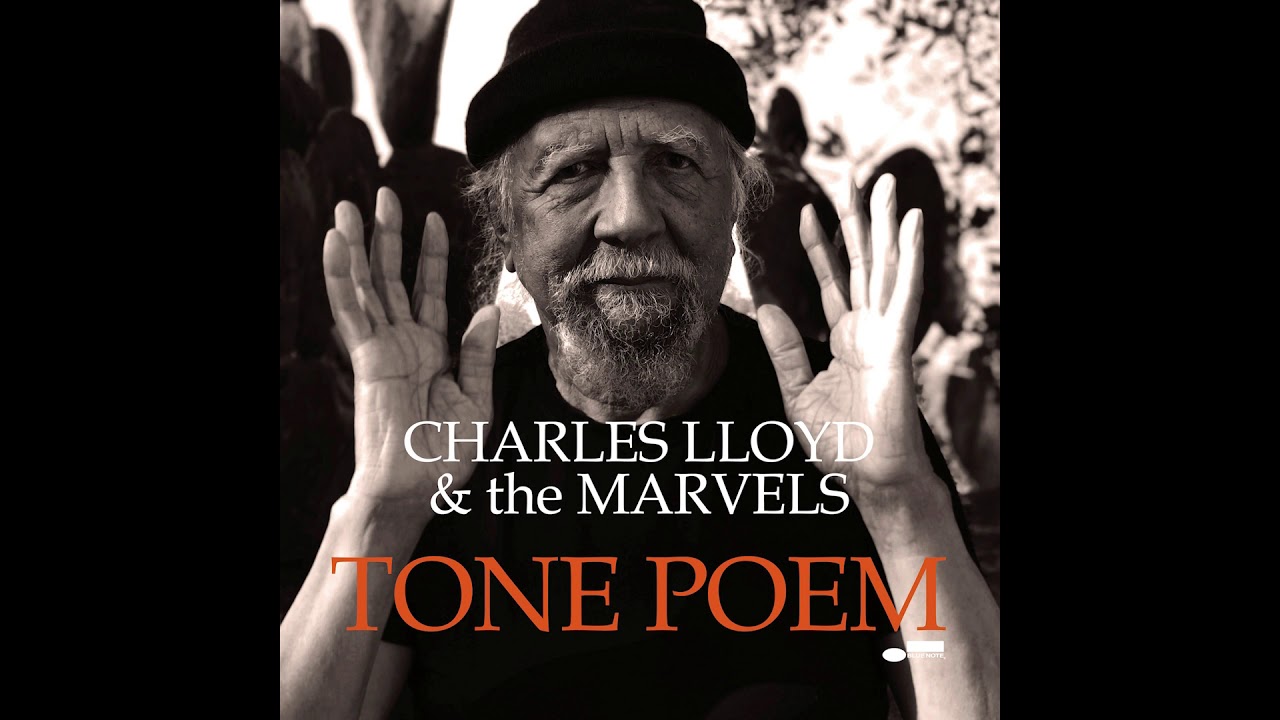Vijay Iyer Trio by Craig Marsden
With my girlfriend away on a three-month residency the mental effects of lockdown finally exacted their toll. I just want to sleep all day, with music haunting my liminal states. I keep listening to a never-ending stream of new music, but like most of us, I’m really dying to hear sounds being made live and in the flesh – not on my computer screen.
When I’m feeling more chipper I exalt in the bounty of music around me, recently compounded by the welcome arrival of my collection that had been in a Chicago storage unit for more than two years.
Lockdown has continued to be good for archival material, and the French imprint Dark Tree has been exemplary with its excavations of music from the potent but often overlooked Los Angeles scene during the 1970s and 1980s. In 2021 the imprint has complemented previous titles by Horace Tapscott, Vinny Golia, and John Carter & Bobby Bradford with a gem from bassist Roberto Miranda.
Live At Bing Theater features Miranda’s Home Music Ensemble, a 1985 concert which brought together Tapscott, Carter, Bradford, and flautist James Newton in the same band for the first time. Although known as a sideman, Miranda’s writing for the 11-member ensemble is assured, varied, and absorbing. Most importantly, it provides the excellent band plenty of grist for the improvisational mill.
The music weaves in rhythms from the bassist’s ancestral homeland of Puerto Rico, with his father Louis Sr. and his brother Louis Jr. adding percussion to compositions that groove and meditate. But, in all honestly, it’s the opportunity to hear those storied improvisers, beautifully recorded, that makes this an essential document.
ICP Septet + Joris Roelofs, Terrie Ex, and Mara’s Pianola – Komen & Gaan
(ICP)
This casual gathering in the tiny village East Friesian village of Oldeberkoop in the Netherlands features the members of Amsterdam’s mighty ICP Orchestra who are not stuck in other climes due to the Corona pandemic joined by two capable guests. The low-key recording is mirrored by images in the CD booklet, as music making is interspersed with meals and drinks. A couple of tunes turn up, including two spins through bassist Ernst Glerum’s old-school ballad ‘De Linkerschoen, De Rechterschoen’ and a suitably lose stroll through ICP founder Misha Mengelberg’s ‘Kroket’, but the bulk of the performances, with bass clarinetist Joris Roelofs and guitarist Terrie Ex fleshing out the group, are improvised, usually in small groupings indicated by titles like ‘MaGuTer’, contractions of the first names of each player (in this case, violist Mary Oliver, pianist Guus Janssen, and Terrie). Album opener ‘Lucht’ sounds like a patient, breath-driven exploration of the room, while ‘Pianola Potpourri’ is an ad hoc jazz medley using the room’s decommissioned player piano.
Chris Pattishall – Zodiac Suite
(self-released)
It takes cojones for a jazz artist to interpret a classic album on a debut recording, but pianist Chris Pattishall – a mainstream presence on the New York scene – clearly has the confidence and vision to pull it off. Leading a sleek quintet, he remakes the brilliant, still-overlooked 1945 trio album by pianist Mary Lou Williams Zodiac Suite, a wildly diverse, astonishingly original, and masterful portrait of the 12 astrological signs distinguished as much by her inventive writing and arrangements as her agile playing. Working with producer Rafiq Bhatia (Son Lux), Pattishall recast the album for a quintet with drummer Jamison Ross, bassist Marty Jaffe, trumpeter Riley Mulherker (Westerlies), and saxophonist Ruben Fox, deftly highlighting the genius of the material but transplanting its essence to the presence, especially in the way the horns translate parts originally written for piano and bass. The gorgeous melodies may evoke the post-swing era, yet the arrangements, subtle electronic flourishes, and a dazzling sense of economy from each player — both on meticulous charts and concise improvisation — sounds totally modern.
Hafez Modirzadeh – Facets
(Pi Recordings)
Iranian-American saxophonist Hafez Modirzadeh is part of a growing number of musicians exploring different modes of expression to incorporate microtonality with jazz practice. This latest endeavour to advance his theory of “chromodality” — fusing Persian scales with standard Western temperament — enlists three excellent pianists to perform on a specially tuned instrument that re-tunes eight keys on a keyboard while leaving the rest in equal temperament. He sent his scores for a series of duo pieces in advance to Kris Davis, Craig Taborn, and Tyshawn Sorey (the acclaimed drummer and composer who also happens to be an excellent pianist), but each musician encountered the re-tuned piano for the first time in the studio. Most of the tracks are pensive original pieces where the pitches may seem wobbly to ears only accustomed to standard scales, but the microtonality brings out strange, alluring new harmonies and melodic lines of much greater nuance. Especially interesting are some classics by Thelonious Monk, a pianist who famously inserted an adjacent note to suggest a bent or “blue note”.
[Ahmed] – Nights on Saturn (communication)
(Astral Spirits)
The third searing album from this European quartet continues to investigate the compositions of the American bassist and oud player Ahmed Abdul-Malik, who connected traditional Arabic modes with jazz in the 1950s. Pianist Pat Thomas, reedist Seymour Wright, bassist Joel Grip, and drummer Antonin Gerbal deconstruct a pair of their namesake’s tunes — cited in the piece’s title — as a launch pad for its own feverish journey, a single 41-minute track cut live at Café Oto in December of 2019 that collides simple Arabic modes with a series of riveting, almost violent trances. In this particular iteration Grip and Gerbal hold steady with buoyant rhythms that swing and stutter, giving the pianist and saxophonist a platform to explode a couple of terse patterns. They cycle through these phrases with exhilarating give-and-take, a kind of charging strain of meditation where they phase in and out of one another’s orbit with constantly morphing but extremely subtle modulations of pitch and rhythm. [Ahmed] has enjoyed a relentless creative ascent with each new release, and more than a year after the general erasure of live performance, there’s no single group I’d rather break that silence with.
Vijay Iyer Trio – UnEasy
(ECM)
The first two tracks on Vijay Iyer’s new trio album are meant to draw attention to social problems roiling the US: ‘Children Of Flint’ invokes innocent victims of the water crisis in the titular Michigan city, while ‘Combat Breathing’ was composed to accompany a political action in the wake of the Black Lives Matter movement. The musical content of those compositions doesn’t explicitly reference either subject, although without water and breath we don’t exist, and that seems to be the larger point in the pianist’s music here, a statement concerning our most basic needs, including companionship. The music on UnEasy isn’t as turbulent as that title might suggest, and the bond he’s formed with drummer Tyshawn Sorey, a collaborator for more than two decades, and bassist Linda May Han Oh, a more recent musical partner, couldn’t be much more fluid. The ten pieces assembled cover two decades of the pianist’s career, including a new version of ‘Configurations’, originally on his 2001 album Panoptic Modes, an elegant stroll through ‘Night And Day’ modelled after McCoy Tyner’s playing on the 1966 Joe Henderson version of the tune, and an homage to pianist Geri Allen via her ‘Drummer’s Song’.
Punkt.Vrt.Plastik – Somit
(Intakt)
The second album from what might be the most exciting piano trio today raises the stakes from its bracing eponymous 2018 debut. Pianist Kaja Draksler, bassist Petter Eldh, and drummer Christian Lillinger proceed with clockwork exactitude on material that perpetually teeters on the edge of an abyss. Rhythms splinter and fracture, forging uneasy alliances with melodies that seem to mock the polyrhythmic, post-hip hop propulsion. The simple repeating piano melody of Eldh’s ‘Natt Raum’ — played, like everything here, on an upright — sails along gleefully impervious to the way the wildly careening groove seeks to practically crush it, while Draksler’s sparkling tones on ‘Vrvica’ use their own splattery logic against the roiling grooves of her partners. One of the year’s best, no doubt.
Binker Golding, John Edwards & Steve Noble – Moon Day
(Byrd Out)
London saxophonist Binker Golding is known best for his long-running duo with drummer Moses Boyd, where they’ve forged a strain of high-octane free jazz that never strays too far from a tight groove. Golding has been exploring other settings in recent years, including a superb duo with pianist Elliot Galvin and now comes this improvised album made last summer between lockdowns with bassist John Edwards and drummer Steve Noble, both endlessly imaginative linchpins of the British improv scene. I give credit to Golding for having the guts to spar with such heavies, players who long ago jettisoned any kind of pattern-driven safety net. From the outset they feed and respond to Golding’s grainy sighs, sobs, and sorties with typical unpredictability, while offering stealthy but forceful shape-shifting grooves, an area where the saxophonist remains most comfortable, breaking down post-bop phrasing into koan-like pleas.
Charles Lloyd & the Marvels – Tone Poem
(Blue Note)
Veteran reedist Charles Lloyd built the Marvels around the blend of guitarist Bill Frisell and pedal steel whiz Greg Leisz five years ago, complemented by the presence of non-jazz singers Lucinda Williams, Willie Nelson, and Norah Jones. Tone Poem is the band’s first instrumental outing, but there’s no doubt that Lloyd and the guitarists are singing. The album opens with a pair of Ornette Coleman tunes that showcase the band’s fluidity and soulfulness: “Peace” is aptly meditative and searching, while “Ramblin’” is groovy and rooted in the blues. The album’s long, patient arc drifts towards more meditative modes in fits and starts, with the agile rhythm section of bassist Ruben Rogers and drummer Eric Harland sculpting a springy, elastic foundation that erases genre lines in favor of mood and empathy. There’s a lilting version of Leonard Cohen’s “Anthem” with the frontline braiding its melodic inventions like vines fanning out over a wall, and the interplay is just as sublime on the shuffling title track, a Lloyd composition. Now 83, he’s rarely sounded more profound.
Lina Allemano Four – Vegetables
(Lumo)
Trumpeter Lina Allemano maintains an existence split between her native Toronto and Berlin, with projects unique to both locales—although the pandemic has pretty much kept her in Canada over the last year. Vegetables is the latest albums from one of her oldest and best bands, an acoustic Toronto quartet with saxophonist Brodie West, bassist Andrew Downing, and drummer Nick Fraser built upon intense interplay, both composed and improvised. The album opener “Onions” embroiders the indelible opening phrase from the Dizzy Gillespie bebop standard “Salt Peanuts,” but as a peanut is a legume, not a vegetable the piece quickly pivots into a lurching vehicle built upon the thick arco lines from Downing as the frontline lays out some bracing multi-linear improvising. Allemano’s sturdy tunes toggle between off-kilter swing and blocky rhythms, all of them designed to foster charged, spontaneous interactions between musicians who have learned how to anticipate one another’s next moves.
Zeena Parkins, Mette Rasmussen & Ryan Sawyer – Glass Triangle
(Relative Pitch)
Zeena Parkins sets the tone in every way on this bruising free improv session, using her electric harp in enough different ways that it seems like she’s playing a new instrument on each of the six pieces. She doesn’t dominate, but her input alters the context for the slashing alto saxophone of Mette Rasmussen and high-energy rhythmic streams of Ryan Sawyer. On “Nat Bygone, just biggone” she produces a thrumming low end of sludgy noise, while on “Flod of Trees” she uncorks sustained stabs of noise, like a jacked-up Theremin with a short in its wiring, and in each case her chameleonic presence has the effect of transforming the energy and aura of each piece, although no level-headed person could deny the ability of her partners to exert that sort of change, too. The damped harmonic flutters Rasmussen blows on the start “The crystal chain letters” establish a clear vibe, answered by Sawyer’s kinetic stutters and Morse code transmissions. It all works due to their genuine willingness to listen.




